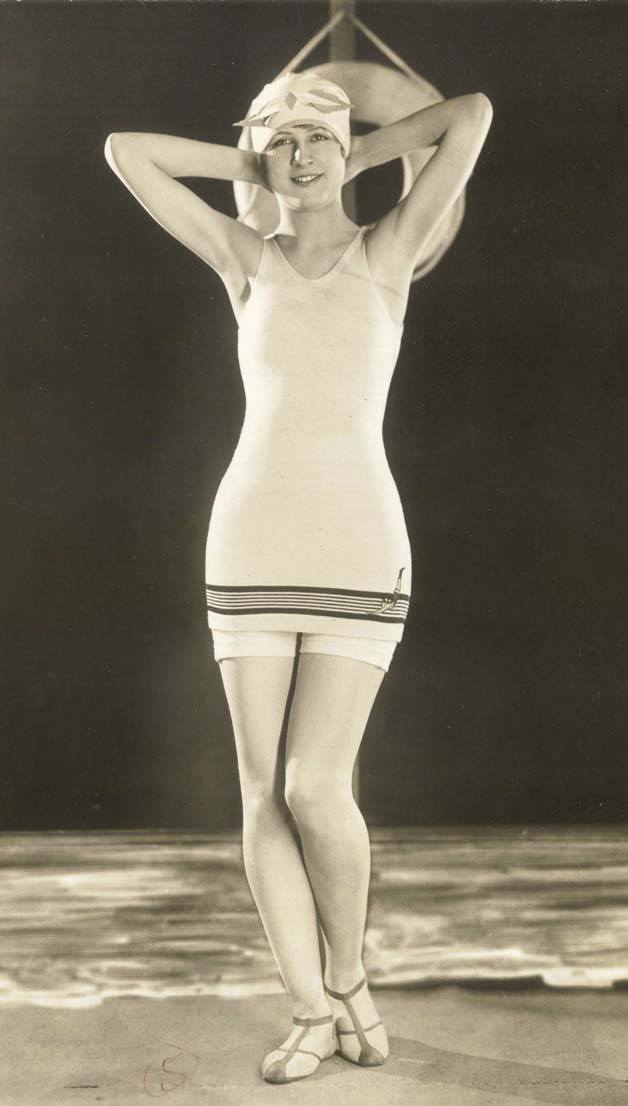Throughout history, society has placed specific expectations on how women should act and look. And there is, perhaps, no other garment that reveals those expectations better than the swimsuit.
The White River Valley Museum will delve into the cultural ideals and realities of women’s bodies over the last century by examining the history of bathing suits. “Yellow Polka Dot Bikinis and Tummy Crunches: A Century of Female Bodies and Swimsuits” opens Wednesday and will be on display through July 31.
The exhibit, sponsored by Jantzen Apparel, LLC., will take visitors through a time warp of swimwear dated from 1910-2010. Swimsuits and other pieces will be displayed by decade, with most items coming from the Jantzen archives.
“The history of women’s swimwear reveals the vast array of beauty that is the American woman and the pressures under which she has been placed,” said museum director Patricia Cosgrove. “Bathing suits across the decades show us how cultural ideals for women’s bodies have literally expanded, contracted and expanded again.”
From the androgynous woolen-clad figure of the 1920s and voluptuous wartime pinups to the post-war bikini for the Twiggy-thin counter culture and LYCRA® for the modern woman’s buns of steel, the exhibit partners each decade of swimsuits with corresponding advertising art, diet and exercise manuals, and images of local beauty queens.
As the museum staff wrap up final details for “Yellow Polka Dot Bikinis,” they invite anyone who has swimsuits, bathing caps, beach towels and similar items dating from 1910 to 1970 to consider donating them.
“So often these treasures are sitting in boxes in attics when they could be shared with the public, telling a story in a museum exhibit,” Cosgrove said. “As an historical institution, we’re well equipped to properly store and preserve any number of historical fashion items and family heirlooms.”
Donating historical items broadens the depth and breadth of the museum’s artifact collection and allows the museum to tell historically accurate stories with an interesting twist, such as the “Yellow Polka Dot Bikinis” exhibit.
Before an item is formally accepted, it will be compared to any similar artifacts currently in the museum’s collection. Swimwear donations may be used in “Yellow Polka Dot Bikinis” or preserved for use in a future exhibit. If you have an item of interest, contact Hilary Pittenger at 253-288-7439 or hpittenger@auburnwa.gov.
Shop for swimwear by Jantzen Apparel for the duration of “Yellow Polka Dot Bikinis” at Rottles Clothing and Shoes, 226 E. Main St. in Auburn.
=====
Related events
The following museum events are offered in conjunction with “Yellow Polka Dot Bikinis.” Unless otherwise noted, events are included with museum admission.
• Mother’s Day Celebration: High Tea at the Museum, Saturday, May 7, 1 p.m. and 3 p.m.
Celebrate Mother’s Day with high tea at the White River Valley Museum. View the exhibit “Yellow Polka Dot Bikinis and Tummy Crunches: A Century of Female Bodies and Swimsuits” and then enjoy savories, sweets and tea. The cost is $10 per person. Reservations required by calling 253-288-7433.
• Body Image and the Path to Perfection, June 11, 1 to 3 p.m.
Join women’s historian Dr. Michelle Marshman for a revealing discussion and slideshow about diet, exercise and the ever-changing silhouette of the perfect female body.
• Family Day: Beach Essentials, June 18, noon to 4 p.m.
Join the White River Valley Museum for an exciting exploration of summer-time fun and enjoy hands-on activities for the whole family.
=====
About the museum
The White River Valley Museum is a partnership with the City of Auburn and combines history and culture to create an exciting and educational experience for visitors. Museum collections focus on Puget Sound history, Northwest Indian culture, Japanese immigration and the Northern Pacific Railway.
The museum is open Wednesday through Sunday from noon to 4 p.m. and is located at 918 H St. SE in Auburn. Regular admission is $2 adults, $1 seniors and children. Admission is free on Wednesdays and the fourth Sunday of the month. Call 253-288-7433 or visit www.wrvmuseum.org for event information.


